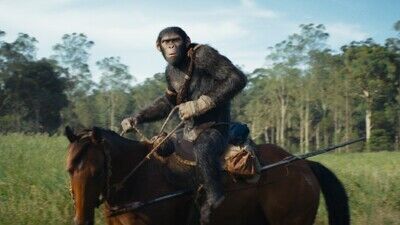But when a mysterious human—Freya Allan’s feral and mercurial Mae—who is tailing him accidentally breaks it, Noa sets off to find a new one, unintentionally making his peaceful home base a target of the villainous masked apes led by Proximus Caesar (Kevin Durand). Twisting Caesar’s dignified teachings and wise words like “Apes Together Strong” and building an army to one day possess the secrets to the technology humans have left behind generations ago, Proximus destroys Noa’s village, kills his father, and hunts down Mae in his quest. Throughout these nail-biter cat-and-mouse sequences, immersive cinematographer Gyula Pados’ camerawork is impressive and spine-tinglingly exciting, crafting large-scaled action that is heart-poundingly tense, and more logically constructed than what we often see these days.
After a lovely interlude when Noa meets a lonesome orangutan and learns about the real Caesar as a strong, moral, and compassionate leader, the young ape and Mae find themselves in Proximus’ captivity along with other enslaved members of the Eagle Clan, including Noa’s aforementioned buddies. At a windswept and ocean-battered base next to a locked vault that humans have evacuated, there is also William H. Macy’s Trevathan, an intelligent, Vonnegut-reading human tasked to teach Proximus everything he knows about the human ways. Daniel T. Dorrance’s production design truly sings in these segments with the level of detail draped across the “Waterworld”-like ape settlement and the vault, once we finally get inside (albeit, perhaps a bit conveniently).
Gradually and throughout a stunning third act where the “Kingdom” unleashes some truly stunning “The Way of Water”-style visuals, the film plants the seeds of even further chapters to come, renewing its thematic queries around whether inter-species peace could ever be achieved. But perhaps more importantly, the pronouncedly anti-gun and anti-violence “Kingdom” explores the concerns and catastrophes of the modern world smartly and thoughtfully within its construct. Are there times that necessitate the abandonment of pacificism? (There is especially one shocking scene involving Mae that ponders this question that a lesser toothless film would be too afraid to ask.) Are we learning the right lessons from our past, if we’re learning anything at all? Why the hell can’t we all get along?
To be clear, “Kingdom” doesn’t have the answers. But you can bet your bottom dollar that this rare, deeply cinematic Hollywood franchise won’t stop digging until we get a little closer to knowing.

